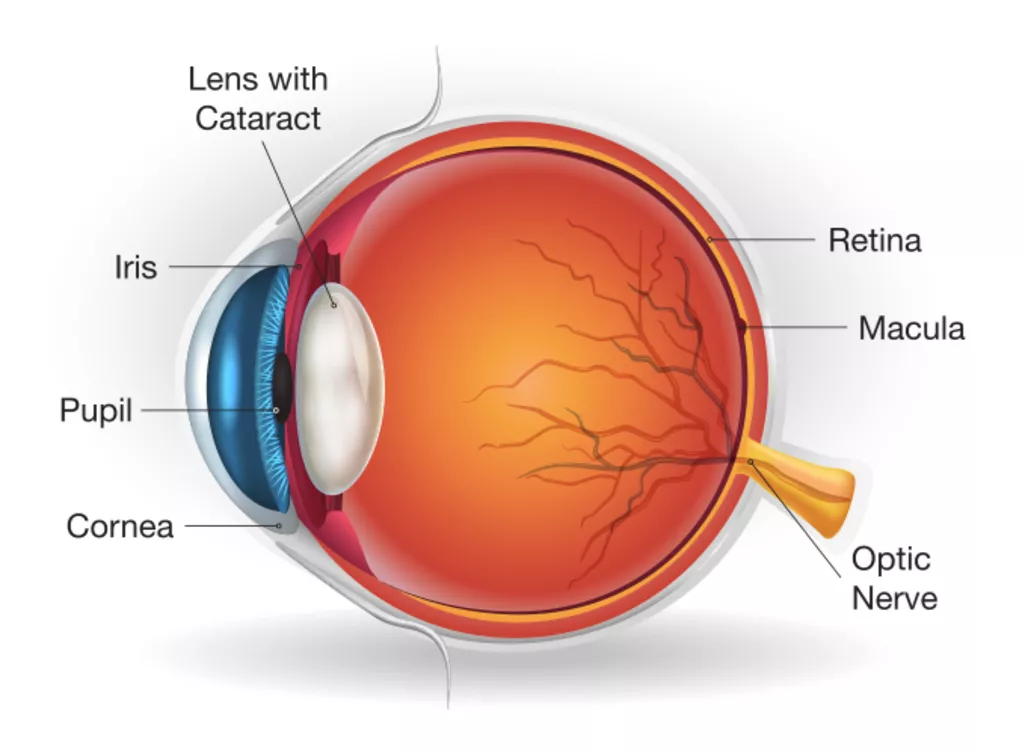What is a cataract?
Like a camera, every eye has a lens. When the lens inside your eye clouds over it reduces the amount of light reaching the retina at the back of the eye. This makes it difficult for you to see clearly and is called a cataract.
Why do cataracts develop?
Cataracts develop as a normal part of the aging process. By the age of 70 nearly everyone has some degree of cataract formation. Sometimes cataracts may develop at a younger age due to other diseases like diabetes, following an eye injury or due to specific medications, like steroids.

What are the main symptoms of cataracts?
The earliest symptoms can begin with glare and sensitivity to bright light, or haloes around lights. Vision then typically becomes progressively more blurred, foggy, and sometimes doubled. Colours often become duller and darker.

When is cataract surgery necessary?
A mild cataract, that does not cause many symptoms, can sometimes be left alone, or vision can be improved a little with updated glasses. Cataracts will continue to progress, but usually slowly. When the blurred vision becomes troublesome in daily activities, then surgery is usually recommended.
What does cataract surgery involve?
Modern cataract surgery restores the eyesight lost due to cataract by removing the natural cloudy lens in the eye and replacing it with a clear artificial lens implant. Eye Doctors undertake this operation using the latest small incision techniques and most up to date equipment available to give the fastest recovery and best possible vision. Cataract surgery is usually carried out under topical anaesthesia, where the eye is numb, but you are awake. In most cases injections and intravenous lines are not required.
How long does cataract surgery take?
The procedure itself generally takes from ten to twenty minutes. You will go home the same day, after spending two to three hours in hospital.
How long does to take to recover from cataract surgery?
A shield or patch may be worn following surgery and you are advised not to drive until given clearance by your surgeon, which is often the next day. Rubbing your eye, very strenuous activity and swimming should be avoided for one week. You can resume most other activities straight away. Eyedrops are usually required for 4 weeks following the surgery.
Can a cataract come back?
No. Once it has been removed, a cataract does not recur. The artificial lens implant that replaces the cataract stays in your eye for the rest of your life.
Is cataract surgery safe?
Cataract surgery is the most common eye operation and one of the most common surgical procedures performed in New Zealand. It has a very high success rate due to the modern methods used. Like any operation, there is a small risk of complications during and after the surgery that your surgeon will discuss with you.
What lenses are used?
A full range of intraocular lenses are available for people having a cataract operation with Eye Doctors. Just as there are different types of glasses (eg: single vision, bi-focal and progressive), there are different types of lenses that can be inserted into the eye during cataract surgery. The lens implants used are able to correct for focus errors (myopia, hyperopia and astigmatism) and in some cases glasses will not be required following cataract surgery. Eye Doctors surgeons will discuss your options and recommend which lens is best for your requirements.

